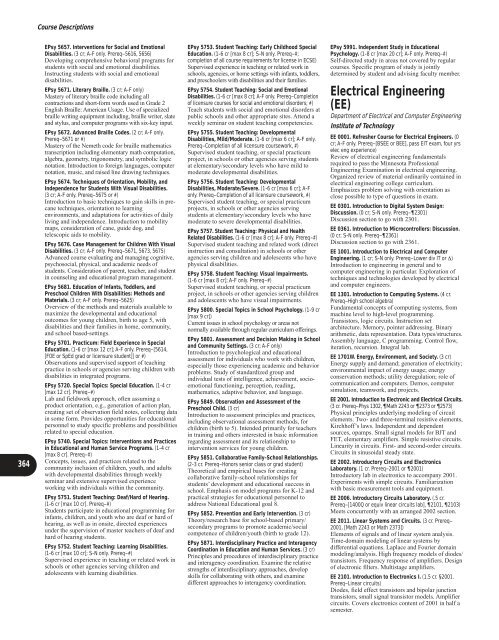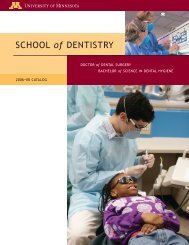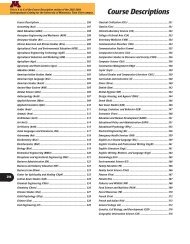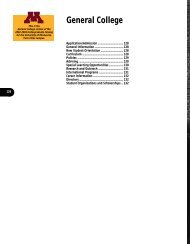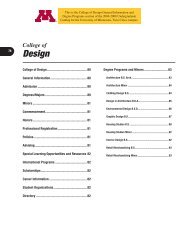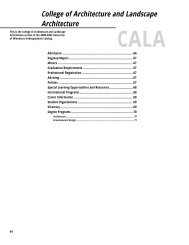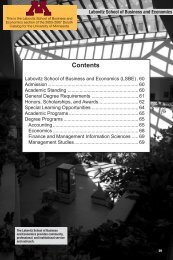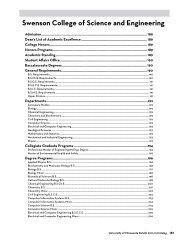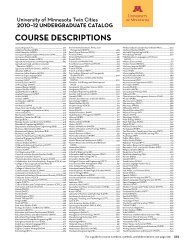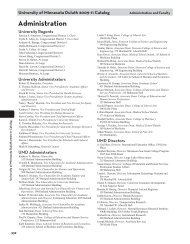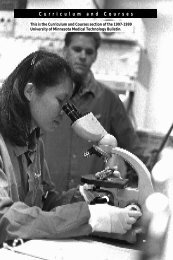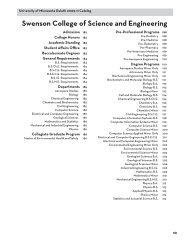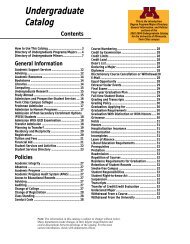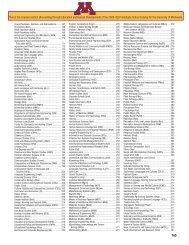CoursesâCSCI through FSCN - University Catalogs - University of ...
CoursesâCSCI through FSCN - University Catalogs - University of ...
CoursesâCSCI through FSCN - University Catalogs - University of ...
Create successful ePaper yourself
Turn your PDF publications into a flip-book with our unique Google optimized e-Paper software.
Course Descriptions364EPsy 5657. Interventions for Social and EmotionalDisabilities. (3 cr; A-F only. Prereq–5616, 5656)Developing comprehensive behavioral programs forstudents with social and emotional disabilities.Instructing students with social and emotionaldisabilities.EPsy 5671. Literary Braille. (3 cr; A-F only)Mastery <strong>of</strong> literary braille code including allcontractions and short-form words used in Grade 2English Braille: American Usage. Use <strong>of</strong> specializedbraille writing equipment including, braille writer, slateand stylus, and computer programs with six-key input.EPsy 5672. Advanced Braille Codes. (2 cr; A-F only.Prereq–5671 or #)Mastery <strong>of</strong> the Nemeth code for braille mathematicstranscription including elementary math computation,algebra, geometry, trigonometry, and symbolic logicnotation. Introduction to foreign languages, computernotation, music, and raised line drawing techniques.EPsy 5674. Techniques <strong>of</strong> Orientation, Mobility, andIndependence for Students With Visual Disabilities.(3 cr; A-F only. Prereq–5675 or #)Introduction to basic techniques to gain skills in precanetechniques, orientation to learningenvironments, and adaptations for activities <strong>of</strong> dailyliving and independence. Introduction to mobilitymaps, consideration <strong>of</strong> cane, guide dog, andtelescopic aids to mobility.EPsy 5676. Case Management for Children With VisualDisabilities. (3 cr; A-F only. Prereq–5671, 5673, 5675)Advanced course evaluating and managing cognitive,psychosocial, physical, and academic needs <strong>of</strong>students. Consideration <strong>of</strong> parent, teacher, and studentin counseling and educational program management.EPsy 5681. Education <strong>of</strong> Infants, Toddlers, andPreschool Children With Disabilities: Methods andMaterials. (3 cr; A-F only. Prereq–5625)Overview <strong>of</strong> the methods and materials available tomaximize the developmental and educationaloutcomes for young children, birth to age 5, withdisabilities and their families in home, community,and school based-settings.EPsy 5701. Practicum: Field Experience in SpecialEducation. (1-6 cr [max 12 cr]; A-F only. Prereq–[5614,[FOE or SpEd grad or licensure student]] or #)Observations and supervised support <strong>of</strong> teachingpractice in schools or agencies serving children withdisabilities in integrated programs.EPsy 5720. Special Topics: Special Education. (1-4 cr[max 12 cr]. Prereq–#)Lab and fieldwork approach, <strong>of</strong>ten assuming aproduct orientation, e.g., generation <strong>of</strong> action plan,creating set <strong>of</strong> observation field notes, collecting datain some form. Provides opportunities for educationalpersonnel to study specific problems and possibilitiesrelated to special education.EPsy 5740. Special Topics: Interventions and Practicesin Educational and Human Service Programs. (1-4 cr[max 8 cr]. Prereq–#)Concepts, issues, and practices related to thecommunity inclusion <strong>of</strong> children, youth, and adultswith developmental disabilities <strong>through</strong> weeklyseminar and extensive supervised experienceworking with individuals within the community.EPsy 5751. Student Teaching: Deaf/Hard <strong>of</strong> Hearing.(1-6 cr [max 10 cr]. Prereq–#)Students participate in educational programming forinfants, children, and youth who are deaf or hard <strong>of</strong>hearing, as well as in onsite, directed experiencesunder the supervision <strong>of</strong> master teachers <strong>of</strong> deaf andhard <strong>of</strong> hearing students.EPsy 5752. Student Teaching: Learning Disabilities.(1-6 cr [max 10 cr]; S-N only. Prereq–#)Supervised experience in teaching or related work inschools or other agencies serving children andadolescents with learning disabilities.EPsy 5753. Student Teaching: Early Childhood SpecialEducation. (1-6 cr [max 8 cr]; S-N only. Prereq–#;completion <strong>of</strong> all course requirements for license in ECSE)Supervised experience in teaching or related work inschools, agencies, or home settings with infants, toddlers,and preschoolers with disabilities and their families.EPsy 5754. Student Teaching: Social and EmotionalDisabilities. (1-6 cr [max 8 cr]; A-F only. Prereq–Completion<strong>of</strong> licensure courses for social and emotional disorders; #)Teach students with social and emotional disorders atpublic schools and other appropriate sites. Attend aweekly seminar on student teaching competencies.EPsy 5755. Student Teaching: DevelopmentalDisabilities, Mild/Moderate. (1-6 cr [max 6 cr]; A-F only.Prereq–Completion <strong>of</strong> all licensure coursework, #)Supervised student teaching, or special practicumproject, in schools or other agencies serving studentsat elementary/secondary levels who have mild tomoderate developmental disabilities.EPsy 5756. Student Teaching: DevelopmentalDisabilities, Moderate/Severe. (1-6 cr [max 6 cr]; A-Fonly. Prereq–Completion <strong>of</strong> all licensure coursework, #)Supervised student teaching, or special practicumprojects, in schools or other agencies servingstudents at elementary/secondary levels who havemoderate to severe developmental disabilities.EPsy 5757. Student Teaching: Physical and HealthRelated Disabilities. (1-6 cr [max 8 cr]; A-F only. Prereq–#)Supervised student teaching and related work (directinstruction and consultation) in schools or otheragencies serving children and adolescents who havephysical disabilities.EPsy 5758. Student Teaching: Visual Impairments.(1-6 cr [max 8 cr]; A-F only. Prereq–#)Supervised student teaching, or special practicumproject, in schools or other agencies serving childrenand adolescents who have visual impairments.EPsy 5800. Special Topics in School Psychology. (1-9 cr[max 9 cr])Current issues in school psychology or areas notnormally available <strong>through</strong> regular curriculum <strong>of</strong>ferings.EPsy 5801. Assessment and Decision Making in Schooland Community Settings. (3 cr; A-F only)Introduction to psychological and educationalassessment for individuals who work with children,especially those experiencing academic and behaviorproblems. Study <strong>of</strong> standardized group andindividual tests <strong>of</strong> intelligence, achievement, socioemotionalfunctioning, perception, reading,mathematics, adaptive behavior, and language.EPsy 5849. Observation and Assessment <strong>of</strong> thePreschool Child. (3 cr)Introduction to assessment principles and practices,including observational assessment methods, forchildren (birth to 5). Intended primarily for teachersin training and others interested in basic informationregarding assessment and its relationship tointervention services for young children.EPsy 5851. Collaborative Family-School Relationships.(2-3 cr. Prereq–Honors senior class or grad student)Theoretical and empirical bases for creatingcollaborative family-school relationships forstudents’ development and educational success inschool. Emphasis on model programs for K-12 andpractical strategies for educational personnel toaddress National Educational goal 8.EPsy 5852. Prevention and Early Intervention. (3 cr)Theory/research base for school-based primary/secondary programs to promote academic/socialcompetence <strong>of</strong> children/youth (birth to grade 12).EPsy 5871. Interdisciplinary Practice and InteragencyCoordination in Education and Human Services. (3 cr)Principles and procedures <strong>of</strong> interdisciplinary practiceand interagency coordination. Examine the relativestrengths <strong>of</strong> interdisciplinary approaches, developskills for collaborating with others, and examinedifferent approaches to interagency coordination.EPsy 5991. Independent Study in EducationalPsychology. (1-8 cr [max 20 cr]; A-F only. Prereq–#)Self-directed study in areas not covered by regularcourses. Specific program <strong>of</strong> study is jointlydetermined by student and advising faculty member.Electrical Engineering(EE)Department <strong>of</strong> Electrical and Computer EngineeringInstitute <strong>of</strong> TechnologyEE 0001. Refresher Course for Electrical Engineers. (0cr; A-F only. Prereq–[BSEE or BEE], pass EIT exam, four yrselec eng experience)Review <strong>of</strong> electrical engineering fundamentalsrequired to pass the Minnesota Pr<strong>of</strong>essionalEngineering Examination in electrical engineering.Organized review <strong>of</strong> material ordinarily contained inelectrical engineering college curriculum.Emphasizes problem solving with orientation asclose possible to type <strong>of</strong> questions in exam.EE 0301. Introduction to Digital System Design:Discussion. (0 cr; S-N only. Prereq–2301)Discussion section to go with 2301.EE 0361. Introduction to Microcontrollers: Discussion.(0 cr; S-N only. Prereq–2361)Discussion section to go with 2361.EE 1001. Introduction to Electrical and ComputerEngineering. (1 cr; S-N only. Prereq–Lower div IT or ∆)Introduction to engineering in general and tocomputer engineering in particular. Exploration <strong>of</strong>techniques and technologies developed by electricaland computer engineers.EE 1301. Introduction to Computing Systems. (4 cr.Prereq–High school algebra)Fundamental concepts <strong>of</strong> computing systems, frommachine level to high-level programming.Transistors, logic circuits. Instruction setarchitecture. Memory, pointer addressing. Binaryarithmetic, data representation. Data types/structures.Assembly language, C programming. Control flow,iteration, recursion. Integral lab.EE 1701W. Energy, Environment, and Society. (3 cr)Energy supply and demand; generation <strong>of</strong> electricity;environmental impact <strong>of</strong> energy usage; energyconservation methods; utility deregulation; role <strong>of</strong>communication and computers. Demos, computersimulation, teamwork, and projects.EE 2001. Introduction to Electronic and Electrical Circuits.(3 cr. Prereq–Phys 1302, Math 2243 or 2373 or 2573)Physical principles underlying modeling <strong>of</strong> circuitelements. Two- and three-terminal resistive elements,Kirchh<strong>of</strong>f’s laws. Independent and dependentsources, opamps. Small signal models for BJT andFET, elementary amplifiers. Simple resistive circuits.Linearity in circuits. First- and second-order circuits.Circuits in sinusoidal steady state.EE 2002. Introductory Circuits and ElectronicsLaboratory. (1 cr. Prereq–2001 or 2001)Introductory lab in electronics to accompany 2001.Experiments with simple circuits. Familiarizationwith basic measurement tools and equipment.EE 2006. Introductory Circuits Laboratory. (.5 cr.Prereq–[1400Q or equiv linear circuits lab], 2101, 2103)Meets concurrently with an arranged 2002 section.EE 2011. Linear Systems and Circuits. (3 cr. Prereq–2001, [Math 2243 or Math 2373])Elements <strong>of</strong> signals and <strong>of</strong> linear system analysis.Time-domain modeling <strong>of</strong> linear systems bydifferential equations. Laplace and Fourier domainmodeling/analysis. High frequency models <strong>of</strong> diodes/transistors. Frequency response <strong>of</strong> amplifiers. Design<strong>of</strong> electronic filters. Multistage amplifiers.EE 2101. Introduction to Electronics I. (1.5 cr. §2001.Prereq–Linear circuits)Diodes, field effect transistors and bipolar junctiontransistors, small signal transistor models. Amplifiercircuits. Covers electronics content <strong>of</strong> 2001 in half asemester.


